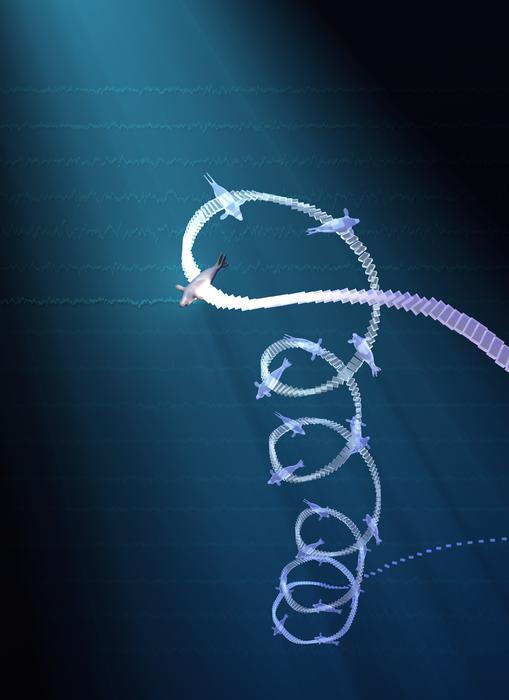Jessica Kendall-Bar, who received her Ph.D. in ecology and evolutionary biology last year from UC Santa Cruz with co-advisors Terrie Williams and Dan Costa, was named a recipient of the prestigious Science & SciLifeLab Prize for Young Scientists for her research on elephant seal sleep habits while they are at sea.

Credit: Graphic by Jessica Kendall-Bar
Jessica Kendall-Bar, who received her Ph.D. in ecology and evolutionary biology last year from UC Santa Cruz with co-advisors Terrie Williams and Dan Costa, was named a recipient of the prestigious Science & SciLifeLab Prize for Young Scientists for her research on elephant seal sleep habits while they are at sea.
The Science & SciLifeLab Prize is an international prize awarded by the American Association for the Advancement of Science (AAAS) and the journal Science to early career scientists for their outstanding thesis research in the life sciences. As a category winner in Ecology & Environment, Kendall-Bar had her essay recently published by Science; she received a $10,000 prize and will soon be headed to the Nobel Prize week in Stockholm to present her research at The Royal Academy of Sciences, where the Nobel Prize in Physics and Chemistry are announced.
“I am grateful for the opportunity to meet the other prize winners and attend the Nobel award ceremony in Sweden in December,” Kendall-Bar said. “I am especially excited to see Katalin Karikó receive her much-deserved Nobel award for laying the scientific groundwork for the mRNA vaccine.”
Kendall-Bar’s research, which was first published in Science in April, was the first time scientists had recorded brain activity in a free-ranging, wild marine mammal. Her research found that while elephant seals may spend 10 hours a day sleeping on the beach during the breeding season, they sleep less than 2 hours a day in the months they are foraging at sea.
To conduct her research, Kendall-Bar designed a new submersible system for electroencephalogram (EEG) recordings of wild northern elephant seals. Her research found that they sleep bilaterally during deep, 30-minute dives, often spiraling downward while fast asleep. She transformed her data into data-driven animations (featured by The New York Times and The Atlantic) of underwater physiology and behavior using a custom visualization pipeline to identify a distinctive biomechanical signature for sleep.
Kendall-Bar wrote an algorithm to estimate sleep from 334 time-depth records, creating a range-wide “sleepscape.” This unparalleled sleep duration flexibility challenges assumptions of baseline mammalian sleep requirements with implications for understanding sleep deprivation.
“These ‘sleepscapes’ can help guide the protection and management of critical resting habitats for marine animals,” Kendall-Bar said. “I am passionate about using data-driven visualizations to connect us to otherwise invisible underwater ecosystems.”
Kendall-Bar is a co-investigator for a new intercampus project supported by UCSC’s Center for Coastal Climate Resilience (CCCR) with the Scripps Institution of Oceanography, and San Diego Supercomputer Center. The work is merging high-performance game engine tools with coastal flooding models to make data-driven digital twins that help visualize climate risks and the role of nature in reducing those risks. This work is helping decisionmakers recognize the value of nature as critical national infrastructure, with recent Executive Orders and Policy Resolutions from the governor of the U.S. Virgin Islands and the U.S. Coral Reef Task Force.
Kendall-Bar is working with scientists at Scripps Institution of Oceanography to produce data-driven visualizations to communicate long-term climate shifts with Argo float data that will premiere at the Ocean Pavillion at the upcoming COP28 in Dubai. Kendall-Bar has also recently launched a freely-available Data-Driven Animation Coursera course to train scientists and artists to tell similar data-driven climate stories. The course was developed with support from the UC Santa Cruz Science Communication Program and Burroughs Wellcome Fund.
“We need to advance innovative solutions for building coastal resilience, especially through effective science communication and collaboration across disciplines and sectors,” Kendall-Bar said. “It is more important than ever that we tell clear and compelling stories about the intersection of humans and the natural world.”
“Jessie is a truly unique scientist with the ability to pair extraordinary scientific skills with exceptional artistic vision. It has been a pleasure for the Center to partner with her on communicating climate risks and solutions,” said CCCR Director Mike Beck.
Kendall-Bar is currently a Schmidt AI in Science Postdoctoral Fellow at Scripps Institution of Oceanography at UC San Diego. Her research investigates the resilience and precarity of ocean ecosystems through neurophysiology, signal processing, and advanced data visualization.
Journal
Science
DOI
10.1126/science.adl4885




